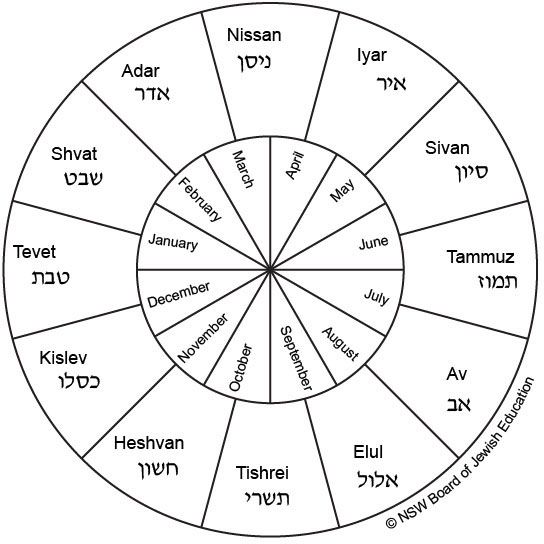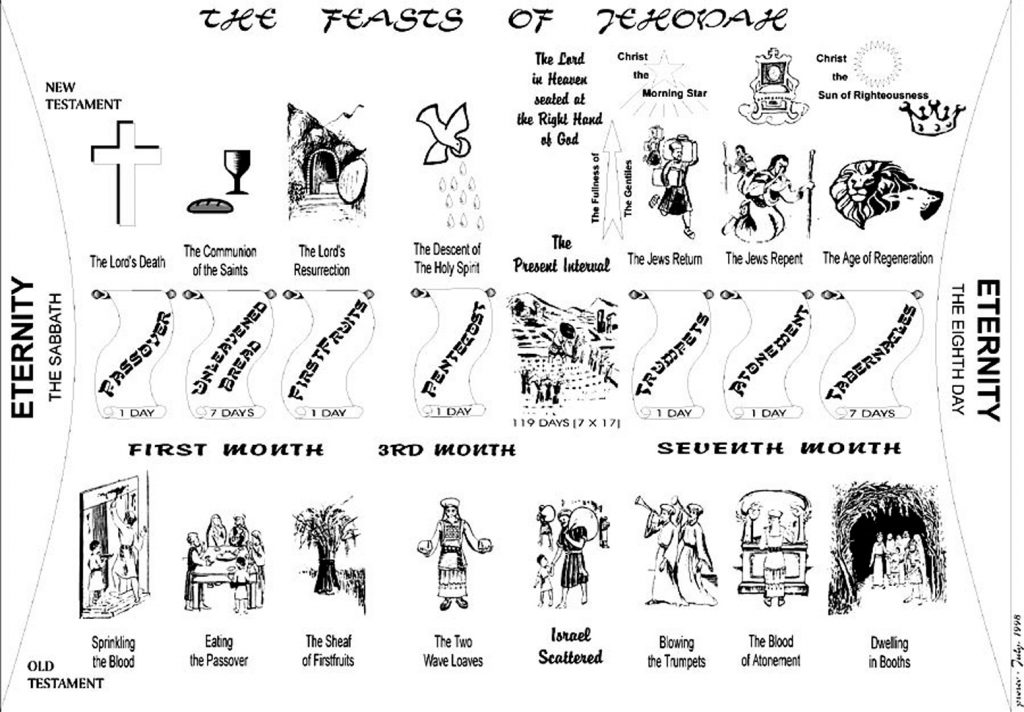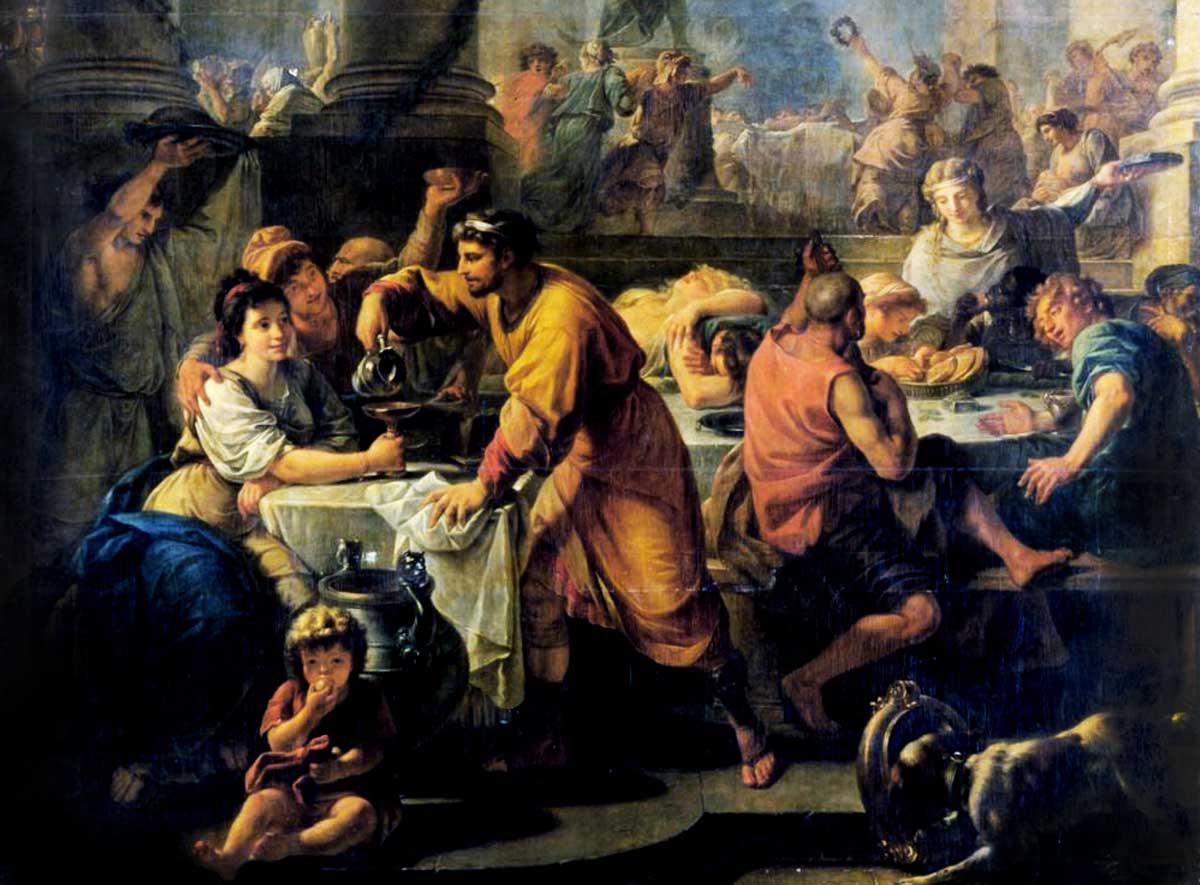It’s that season of the year again where the whole world (Christians and non-Christians alike) engage in the celebration of Christmas. However, let’s take a glance at the Word of God concerning this subject.
According to the World, Christmas is a celebration of the birth of Jesus. You will likely hear things like “He is the reason for the season.” But I have some questions which I would like to ask in this short piece
- Was Jesus really born December 25th?
- Did Jesus tell us to remember his birth?
- What’s the origin of Christmas?
We can’t talk about the birth of Jesus without talking about the birth of John the Baptist who foreran His coming (, , , ). As a matter of fact, the birth of John the Baptist holds crucial evidence and pointers if we are to determine the time of the birth of Jesus.
The Birth of John the Baptist
5 There was in the days of Herod, the king of Judaea, a certain priest named Zacharias, of the course of Abia: and his wife was of the daughters of Aaron, and her name was Elisabeth.
—Luke 1:5-8
6 And they were both righteous before God, walking in all the commandments and ordinances of the Lord blameless.
7 And they had no child, because that Elisabeth was barren, and they both were now well stricken in years.
8 And it came to pass, that while he executed the priest’s office before God in the order of his course,
We are all conversant with this story and as a result become traditional and formal (, ) to it that we miss biblical pieces of evidence surrounding the timing of the birth of Jesus. The above portion of scriptures begins with “In the days of Herod“ . Herod was an Idumean of Esau’s posterity; at this stage Israel had no true Israelite sitting on the throne of David. This was as a result of the prophecy of Isaac in . But in we see another prophecy from Jacob and it was about time for the fulfilment.
But thou, Bethlehem Ephratah, though thou be little among the thousands of Judah, yet out of thee shall he come forth unto me that is to be ruler in Israel; whose goings forth have been from of old, from everlasting.
—Micah 5:2
Though the dominion was with Esau, yet out of Judah was to spring forth the one who is to be ruler in Israel. Oh, how we should want to study bible prophecies more.
The next characters we see are Zecharias and his wife Elisabeth who was barren. It is worthy of note to state that Zecharias was a priest of the course of Abia and he was executing the priestly office in the order of his course.
The Priests’ Course
1 Now these are the divisions of the sons of Aaron. The sons of Aaron; Nadab, and Abihu, Eleazar, and Ithamar.
—1 Chronicles 24:1-4
2 But Nadab and Abihu died before their father, and had no children: therefore Eleazar and Ithamar executed the priest’s office.
3 And David distributed them, both Zadok of the sons of Eleazar, and Ahimelech of the sons of Ithamar, according to their offices in their service.
4 And there were more chief men found of the sons of Eleazar than of the sons of Ithamar; and thus were they divided. Among the sons of Eleazar there were sixteen chief men of the house of their fathers, and eight among the sons of Ithamar according to the house of their fathers.
Here we see the division of the priests into courses. From shows us each course. Each course ministered in its turn for seven days from Sabbath to Sabbath () beginning from the first month (Abib / Nisan). Of all these courses, only four returned from the Babylonian captivity () which were again subdivided into 24, retaining the ancient name and order of each.
The Order of Abia

Let us note that the name Abia is just the Greek derivative of the name Abijah, just like Judas and Judah, Zecharias and Zechariah. The Bible said that Zecharias ministered according to his course. He was of the course of Abia/ Abijah which is the eighth course ()
For the sake of clarity, the image by the left shows the Jewish calendar as it corresponds with our own calendar. The Jewish year begins with Abib/Nisan () which speaks to our March–April.

The priests were to minister according to their courses, beginning from the 1st Sabbath of the 1st month, but we should bear in our minds that all males were to appear before the Lord three times a year in Feast of Passover, Feast of Pentecosts, and Feast of Tabernacles (). This places our counting according to the courses accurately with the chart above. Here we find the course of Abijah in between the Jewish second and third month (Iyar & Sivan) which speaks to May in the Gregorian calendar. After Zecharias ministration, even in the feast of Pentecost which all priest were to present themselves in the tabernacle (the second week of Sivan which is still the month of May), he went to his house and knew his wife Elisabeth (being a biblical term for marital affairs); this places the conception of John at the fourth week of the month of Sivan (June) with a week in-between the day Zecharias met with Elisabeth and the conception of John (Medically, it takes up to 6 days to form a fertilized egg and another 3–4 days for the fertilized egg to implant itself properly into the woman). Elisabeth hid for five months ().
And in the sixth month the angel Gabriel was sent from God unto a city of Galilee, named Nazareth,
—Luke 1:26
In the sixth month of Elisabeth’s pregnancy, that should be about the first week in month Tevet (December), the Angel who is called Gabriel visited Mary
And, behold, thou shalt conceive in thy womb, and bring forth a son, and shalt call his name JESUS.
—Luke 1:31
And, behold, thy cousin Elisabeth, she hath also conceived a son in her old age: and this is the sixth month with her, who was called barren.
—Luke 1:36
Upon hearing of what has happened to Elisabeth, Mary visited Elisabeth and when Elisabeth heard Mary’s greeting, John who was at the sixth month leaped () and Elisabeth was filled with the Holy Ghost and made some proclamations.
42 And she spake out with a loud voice, and said, Blessed art thou among women, and blessed is the fruit of thy womb.
—Luke1:42-43
43 And whence is this to me, that the mother of my Lord should come to me?
Mary was already carrying the baby Jesus and simple arithmetics places six months between the conception of John and the conception of Jesus. In other words, John would be older than Jesus by six months. The time of life is nine months (this is 40 weeks in total—this also highlights the significance of the number 40 in every agenda of God that has to do with new birth and life), therefore, counting nine months from the month of Sivan we should have the last week of Adar (March); therefore John the Baptist should be born in the first week of Abib/Nisan which gives us March in the Gregorian calendar. Six months later from the last week of Adar gives us the second week of the month of Tishri (September–October); the third week is the feast of Tabernacles—Jesus was born on the first day of the feast. It could be no other day! Halleluyah!
The Feasts Connection
In Leviticus 23, God gave the children of Israel seven feasts and these feasts can be helpful also in ascertaining the time of the birth of Jesus.

Two feasts that will assist us here is the Feast of Passover () and the Feast of Tabernacles ().
The Feast of Tabernacles is a dwelling in booths (Heb: Succoth) (). God would choose no period other than the period of the Feast of Tabernacles for the birth of Jesus because He would later come to tabernacle in the Body of Jesus. Therefore the birth and baptism of Jesus must fall on the period of the Feast of Tabernacles, fulfilling all that was written about him. This also falls in the month of Tishri between the 15th and the 22nd.
And the Word was made flesh, and dwelt among us, (and we beheld his glory, the glory as of the only begotten of the Father,) full of grace and truth.
—John 1:14
Now the feast of Passover has to do with the death of the Passover lamb (Exodus 12). The Bible records four Passovers after the Baptism of Jesus with the fourth being his death (; ; and ). If the Baptism of Jesus was in Tishri and He was that true Passover lamb () and he had a ministry spanning three and half years, then we can count accurately and will see that He died in that fourth Passover fulfilling scriptures as the lamb of God ().

Other Connections
1 And it came to pass in those days, that there went out a decree from Caesar Augustus, that all the world should be taxed.
—Luke 2:1-8
2 (And this taxing was first made when Cyrenius was governor of Syria.)
3 And all went to be taxed, every one into his own city.
4 And Joseph also went up from Galilee, out of the city of Nazareth, into Judaea, unto the city of David, which is called Bethlehem; (because he was of the house and lineage of David:)
5 To be taxed with Mary his espoused wife, being great with child.
6 And so it was, that, while they were there, the days were accomplished that she should be delivered.
7 And she brought forth her firstborn son, and wrapped him in swaddling clothes, and laid him in a manger; because there was no room for them in the inn.
8 And there were in the same country shepherds abiding in the field, keeping watch over their flock by night.
If Jesus was born around December as you have always believed, how then do we think the Romans would allow her soldiers to conduct a census during the winter season? Also if truly it was December, there was no way shepherds would be out with their flock in the field in that season of winter.
All these indicators point to the fact that we all have been deceived. Therefore, where did the idea of Christmas spring up from?

Christmas has its pagan origin and has connections with the worship of the sun-god called the birthday of the unconquered. This coincides with the worship of saturnalia and the day of the winter solstice. The word Christmas was 1st used in A.D 324 and later Justinian declared it as an official celebration and holiday. In the days of Emperor Constantine A.D 323 who declared Christianity as the official religion of the Pagan Roman Empire, Christianity adopted Paganism, the church and state got married and paganism crept into the church until it overwhelmed the church. The whole concept of Christmas even predates the birth of Jesus.
Admonition
Save yourself from this untoward generation ()
Avoid vain worship, where traditions are upheld rather than truth ()
We are told to only remember the Lord’s death ()
Contend for the faith once delivered unto the saints (). Obviously the apostles never knew any Christmas.





4 Comments
Blessed be the name of the Lord!!!
God bless you richly precious brother for the exposition.
This is real exposition o. More wisdom Sir!
Thank you very much sir and more grace.
This is evergreen TRUTH